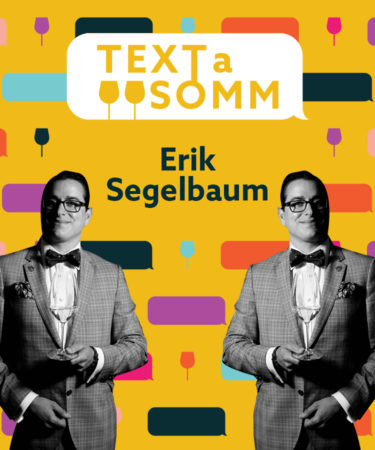On Thursday, May 21, 2020, Erik Segelbaum will be working a shift with VinePair to answer any and all of your wine questions. No question is too simple or too advanced. Text a Somm is a fundraiser in partnership with The United Sommeliers Foundation to benefit the thousands of wine professionals whose careers have been put on hold during the Covid-19 crisis. In addition to paying the sommelier for their shift, VinePair will be making a donation to the USF, and so can you by clicking here. Text your questions to Erik from 7-10 PM ET on Thursday, May 21 at (914) 580-4540.
Erik Segelbaum, advanced sommelier and hospitality consultant, has been in the wine industry for nearly three decades. At present, Segelbaum is the founder and chief “vinnovation” officer at SOMLYAY, a full-service consulting firm addressing all aspects of the beverage, hotel, and restaurant industry. He is also the vice president of The United Sommeliers Foundation.
Prior to launching SOMLYAY, Segelbaum served as corporate beverage director for Starr Restaurants. In this role, he oversaw wine and beverage programs for a diversified portfolio of restaurants, ranging from casual dining all the way up to Michelin Star fine dining.
Don't Miss A Drop
Get the latest in beer, wine, and cocktail culture sent straight to your inbox.Segelbaum says he loves making the process of tasting wine approachable and easy. Under this philosophy, he has delivered countless wine experiences to consumers, including programs dedicated to Madeira (fortified wine), temperature-specific red wine, draft wine, orange wine, and traditional versus non-traditional rosés, to name a few.
At SOMLYAY, Segelbaum continues to provide hiring, training, and education services for wine programs all over the world. Here, he tells VinePair about his love of Riesling, using relatable wine lingo with guests, and making guests feel comfortable.
1. What are you drinking the most in quarantine?
Riesling! Because everything happens for a Riesling! I’ve also been drinking a lot of chilled Italian including Dolcetto, Gaglioppo, Montepulciano, Lacrima, and others.
2. What is the most expensive/ridiculous/memorable bottle you’ve opened in quarantine?
To celebrate my fiancé’s birthday, I opened a 1988 (her birth year) Peter Lauer Riesling Sekt.
3. How do you make guests feel comfortable if they seem intimidated by you (in a restaurant)?
Wine is all about comfort. I ensure guests know that they don’t need to know anything about wine or use any wine language. I assure them that they are the world’s most formative expert in what they like. My goal is to ask guests some basic questions in order to understand what they like and then make the most appropriate match. Basically, I’m their wine “yenta.” I like to joke that they shouldn’t apologize for a lack of wine knowledge because wine knowledge is my job security!
4. What’s the best wine you can get at the grocery or discount store?
“Best” is a really tough word. I’ve seen some incredible wines in grocery stores. Your best bet is to speak to their wine buyer. A wine buyer will always have a hidden gem at a great price that they are passionate about.
5. What regions and styles of wines are you most interested in?
I’m an equal opportunity drinker. That said, I love anything Riesling from anywhere. Also: Portugal, Beaujolais, Italy (especially Marche, Sicily, Sardinia, and Campania), Washington State, Virginia, Germany, Austria, South Africa, Champagne, and then all the usual suspects. So basically, everything.
6. What’s the best way to ask for a budget-friendly bottle at a restaurant?
If you are comfortable with your dining companions, the best way is to come out and say, “I’m looking for a bottle in the X-dollar range, [plus or minus].” If you would rather not discuss the amount in front of your dining guests, a great tactic is to tell the sommelier that you like wines that taste like X wine, while pointing not to a wine but a price on the wine list. The one thing you shouldn’t do is ask for a good “value” wine. I take my wine programs very seriously. As such, all wines are good values. Usually the most expensive wines are the best values because they have the lowest markup percentage. Value does not mean inexpensive.
7. Which regions offer the best value?
It’s hard to generalize, but Portugal, Washington State, South Africa, Beaujolais, Marche, Alto-Adige, and Sicily tend to offer consistently great bang for your buck at any price point.
8. Where do you like to buy wine online (or which clubs do you recommend)?
I am a fan of Benchmark Wine Group since they are always acquiring cellars, so they have ongoing and uniquely interesting inventory.
Ed note: This interview has been edited for length and clarity.
This story is a part of VP Pro, our free content platform and newsletter for the drinks industry, covering wine, beer, and liquor — and beyond. Sign up for VP Pro now!
